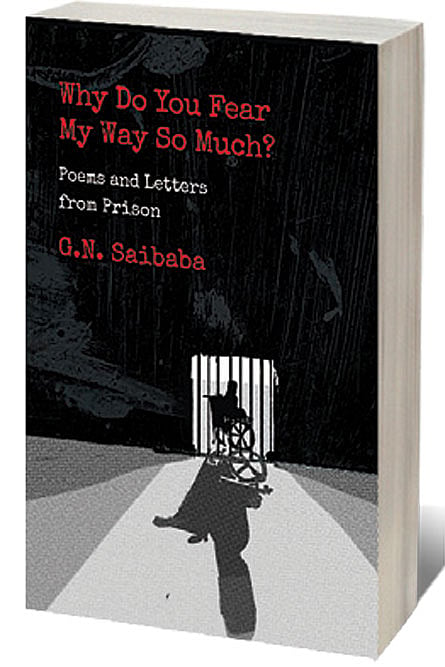No Sky Above

WHY DO YOU Fear My Ways So Much? by GN Saibaba poignantly articulates the human predicament in the face of hardship, suffering and undying hope. Although written from within the dark confines of the “ánda cell” in a prison in Nagpur, the poems have a universal appeal, and stir several emotions in the reader from despair to hope.
GN Saibaba, a professor of English at Delhi University, is an author and human rights activist, who, since 2014, is serving a life sentence under the draconian anti-terror UAPA in solitary confinement. The wheelchair-bound 90 per cent disabled scholar is deprived of medical care and denied bail despite scant evidence of his involvement in any criminal acts. Apart from poems, the book contains pieces from writers and activists Ashok Kumbamu, Ngugi wa Thiong’o and the Dalit poet Meena Kandasamy. ‘The Introduction: Letter to Sai’ containing a short biographical account of the author’s life journey is provided by his loving wife AS Vasantha Kumari. She reminisces about their 30-year relationship that began when both were students in class ten. She recounts how they both helped each other grow emotionally and together stood by values of justice and equality in the face of several adversities. Their journey from Amalapuram (Andhra Pradesh) to Hyderabad to Delhi was traversed reading Tagore, Premchand and Periyar and through participation in various social movements such as workers’ movements and women’s struggles for equality. Vasantha is proud of her husband who valiantly stood for women’s equality and dignity in a patriarchal social order. They loved each other freely, happily and securely. But now “the word love has been enlisted as a crime… Hatred with its poisonous fangs is stimulating violence everywhere”.
The poems have varied themes and subjects. It can be a victim’s testimony, an ode to humanity, diaries of a dreamer, a romanticised account of struggles for justice, scholarly explanations of human suffering and injustice in society, longing for a loved one—all expressed from within the confines of prison cell. “Why do you fear my way so much/ O Pundit, O Mulla/ I’m not an agnostic… I’m not your secularist… I’m not a rationalist… I’m not a heretic… Kabir says/ He’s a messenger of love for people/ Why do you fear my way so much?”
AIming High
20 Feb 2026 - Vol 04 | Issue 59
India joins the Artificial Intelligence revolution with gusto
Kandaswamy writes about how Saibaba’s poems expose the shocking colonial legacy that at times permeates India’s criminal justice system. The British system introduced 160 years ago for the purpose of branding dissidents as seditious traitors still enjoys lawful status in our country! The crime of speaking out against the state is treated as sedition and activists like Saibaba are incarcerated away from loved ones and denied medical care. He is continuously under surveillance, he is not allowed to talk or write in Telugu, his mother tongue, as the prison staff does not know Telugu.
Saibaba is forbidden everything inside the prison. He can’t write letters to his dear ones and therefore the poems addressed to different friends express his innermost feelings. It is remarkable that he does not lose hope and continues dreaming of a better world and the presence of his beloved wife. “My love/ These insults, censures, rumours, oppression, tearing pain and tears—endure a little longer... We will have a life ahead before which you may forgive me for dragging you into this shadow.” He courageously attempts to share his optimism with her although he is in tremendous hardship. “I have no sky above, no earth under my feet. My hands and legs are fettered; only my unchained heart yearns to whisper a little thought… this dark night couldn’t impede the rays of our imaginations meeting.”
Saibaba’s appeal has been pending in the High Court for five years as he remains in solitary confinement. Human rights organisations and scholars worldwide continue to demand an end to his imprisonment. Through these poems he continues to spread love and empathy.

